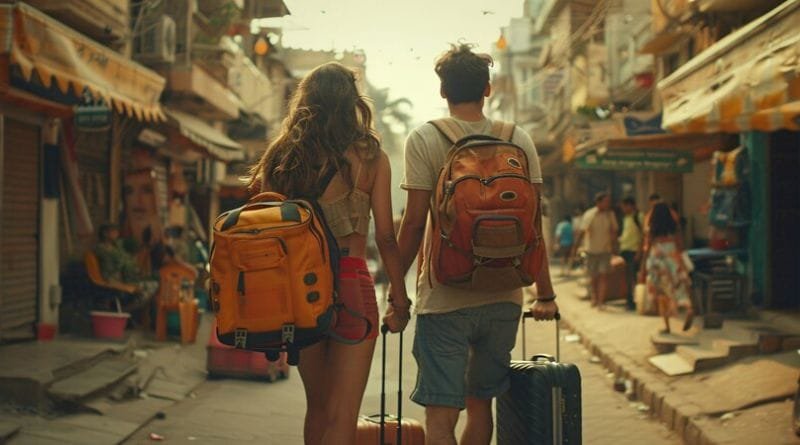
Socio-economic Factors in Travel Narratives
Socio-economic factors deeply shape the narratives of travel, impacting not only who gets to travel but also how, why, and what stories emerge from these journeys. The stories of those who travel for survival often differ significantly from those who travel for leisure, largely because the motives, challenges, and outcomes associated with each kind of travel are intrinsically tied to one’s socio-economic status.
Survival Travel vs. Leisure Travel
The concept of travel encompasses a wide spectrum of experiences, ranging from forced migration due to socio-economic pressures, like poverty or conflict, to voluntary travel driven by personal fulfillment, adventure, or relaxation. Survival travel is a form of movement compelled by necessity—migration for safety, employment, or better living conditions. On the other hand, leisure travel is an option for those who have the financial means to explore destinations primarily for pleasure, learning, or personal growth.
Narratives Shaped by Socio-economic Factors
Socio-economic factors play a crucial role in determining the kinds of narratives that emerge from both types of travel. These factors influence access to resources, transportation, legal documents, and overall travel experiences, leading to distinctive stories that reflect an individual’s socio-economic realities.
Motivation and Purpose
The motivation behind travel varies significantly depending on socio-economic conditions. For those who travel for survival, the narrative is driven by urgency, a sense of escape, and the hope of finding stability or opportunity. Their stories are often about resilience, overcoming barriers, and adapting to new environments under pressure. In contrast, leisure travelers are often motivated by curiosity, personal growth, or relaxation. Their narratives revolve around discovery, enjoyment, and cultural immersion, often highlighting picturesque landscapes or novel experiences.
Challenges and Obstacles
The challenges faced by survival travelers are often more severe and involve higher stakes. These include navigating bureaucratic barriers, enduring physical hardship, facing discrimination, or adapting to vastly different socio-cultural norms in unfamiliar settings. The stories emerging from such journeys often focus on struggle, resourcefulness, and resilience. In contrast, leisure travelers typically encounter logistical inconveniences, language barriers, or cultural misunderstandings, which are relatively low-stakes challenges. Their stories are more likely to include anecdotes about exotic foods, breathtaking sights, or enriching interactions with locals, all of which are framed in a context of temporary experience rather than long-term adjustment.
Resources and Opportunities
The availability of resources significantly shapes the travel narratives of both groups. Those traveling for survival often have limited financial resources, which restricts their mobility, choice of destination, and access to services like healthcare, housing, and employment. Their stories often highlight the impact of socio-economic inequalities and limited access to opportunities. On the contrary, leisure travelers usually have disposable income, which grants them greater freedom in choosing destinations, accommodations, and experiences. Their narratives, thus, tend to reflect abundance, privilege, and a sense of control over their journey.
Cultural Exchange and Interaction
For survival travelers, cultural exchange often occurs out of necessity. They must integrate into new communities and navigate social systems in order to survive, often facing discrimination or marginalization. Their narratives may include themes of identity, displacement, and the search for belonging. Leisure travelers, however, approach cultural exchange from a place of exploration and curiosity, often interpreting foreign cultures through a lens of admiration, romanticism, or even exoticism. The narratives of leisure travel tend to emphasize moments of cross-cultural understanding, culinary exploration, or aesthetic appreciation.
Emotional and Psychological Impact
The psychological and emotional dimensions of travel differ widely depending on socio-economic factors. Survival travel is often accompanied by stress, uncertainty, and trauma, as individuals are forced to leave behind familiar environments, loved ones, and support networks. The stories emerging from such experiences often focus on personal strength, the pain of displacement, or the hope for a better future. Leisure travel, in contrast, is generally associated with pleasure, relaxation, and personal development. These travelers’ narratives often describe transformative experiences, emotional rejuvenation, or a sense of awe inspired by new surroundings.
Socio-economic Factors as a Central Theme in Travel Narratives
The keyword “socio-economic factors” is central to understanding how the stories of travel differ based on the motivations and experiences shaped by economic circumstances. These factors define not just the ability to travel but also the underlying motivations, the nature of the journey, and the outcomes that travelers seek. They play a decisive role in creating distinct, sometimes contrasting narratives of travel that reflect broader societal inequalities.
Conclusion
Socio-economic factors play a pivotal role in shaping the narratives of travel, leading to vastly different stories for those traveling for survival compared to those traveling for leisure. While survival travel is often marked by necessity, struggle, and adaptation, leisure travel is characterized by choice, exploration, and fulfillment. The differences in these narratives reveal much about the disparities that exist within global mobility, shedding light on the broader socio-economic factors that influence who gets to tell stories of travel and how those stories are framed



